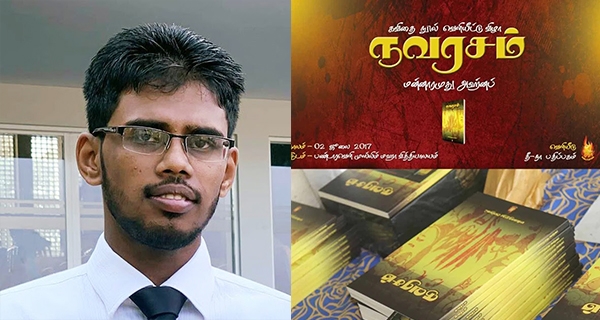A Promising Poet Silenced by the Prevention of Terrorism Act

Ahnaf Jazeem is a 27 year old Muslim poet from the remote village of Chilawathurai in the Mannar District. Ahnaf was arrested on May 16, 2020 by the Counter Terrorism Investigation Division (CTID) of the police under the Prevention of Terrorism Act (PTA). The CTID alleged that Ahnaf’s book Navarasam contained extremist ideas. However, no specific poetry containing extremist ideas was presented to the courts. Authorities who could not read and understand Tamil may have thought that there was some extremism since there were a few pictures of people with weapons in the book.
The CTID report alleged that Ahnaf had shown videos containing extremist ideas to students and tried to inspire extremist thinking. No evidence was produced to the courts to substantiate these allegations.
Throughout his detention Ahnaf was denied meaningful access to lawyers. Nearly 10 months after the arrest, two lawyers were permitted to meet him once for 19 minutes but CTID officers listened in on and recorded the privileged lawyer-client conversation.
Ahnaf was subjected to torture, cruel, inhumane and degrading treatment by being handcuffed to a chair and handcuffed while sleeping as well as being detained in unhygienic and suffocating conditions. He was bitten by a rat and suffered from ureteral stones, a skin rash and psychological breakdowns.
In May 2022, the UN Working Group on Arbitrary Detention has found the Government of Sri Lanka violated international human rights law by imprisoning Ahnaf. The UN concluded that he was prosecuted under a law that “is so broad that it could result in charges being brought against individuals who merely exercised their rights under international law.”
In December 2021, Ahnaf was released on bail. He has to report to the CTID office in Puttalam, about 100 kilometres south of his hometown in Mannar, twice a month. He is currently under surveillance by military intelligence.
Ahnaf spoke to Maatram editor Selvaraj Rajasegar about how his detention has affected him and his work as an activist.
“I was released on bail by the Puttalam High Court. I returned home after 19 months of being in prison. It has been more than one year since I was released but I still cannot feel completely free. There is a case pending at the moment. I continue to be monitored. There have been many occasions where I have found it difficult to travel. I cannot travel on my own. I am compelled to travel with someone in my family. Security officers visited my house on two occasions when I was in my village. They asked questions from my father.
“Once when I was travelling from Colombo, I noticed four or five intelligence officers following me. I have refrained from traveling alone since then. I used to write freely and speak freely before I was arrested. I was involved in my teaching and academic activities in an independent manner. Now I do not have enough freedom to write. I am being monitored in this regard. I am unable to write because of strict bail conditions. I cannot talk to another individual on the road. I cannot speak at a gathering. My teaching activities have also been affected. Since I am unable to do my job properly I am helping my father in farming. I am unable to follow my profession.
“I am the eldest son in the family; I should be looking after my family. My younger brothers are in university so they cannot earn for the family. My father is not in good health. Right now I am in a difficult situation where I cannot support my family.
“I am seen as a person who was imprisoned or a person connected with extremism even when I go to the market or the mosque or even to see a relative in my village. I feel that there is some doubt about me despite the fact that many have spoken on my behalf and have extended their support to me. But I feel that I have lost my support.
“Before my imprisonment I spoke out against injustice and used my poems to comment on social issues. Now I cannot even write a poem describing my situation.
“More than three years has passed since the Easter attacks. Those who orchestrated, planned, were involved and knew but kept silent are in power today. They haven’t been arrested or punished; they have not even been questioned. There are many who were arrested on suspicion and who still languish in prison. Students and academics have been arrested. They have cornered the Muslims like they cornered the Tamils. Now they are arresting Sinhalese student leaders. They are creating political drama using the PTA. They haven’t found the real perpetrators. Unless the real perpetrators are identified, arrested, brought to public forums and punished, the same political culture will prevail; we will continue to be hoodwinked, innocent people will continue to be affected and more lives may be lost.
“It is the people who have to get together and find a solution. It is we who have to struggle.”
